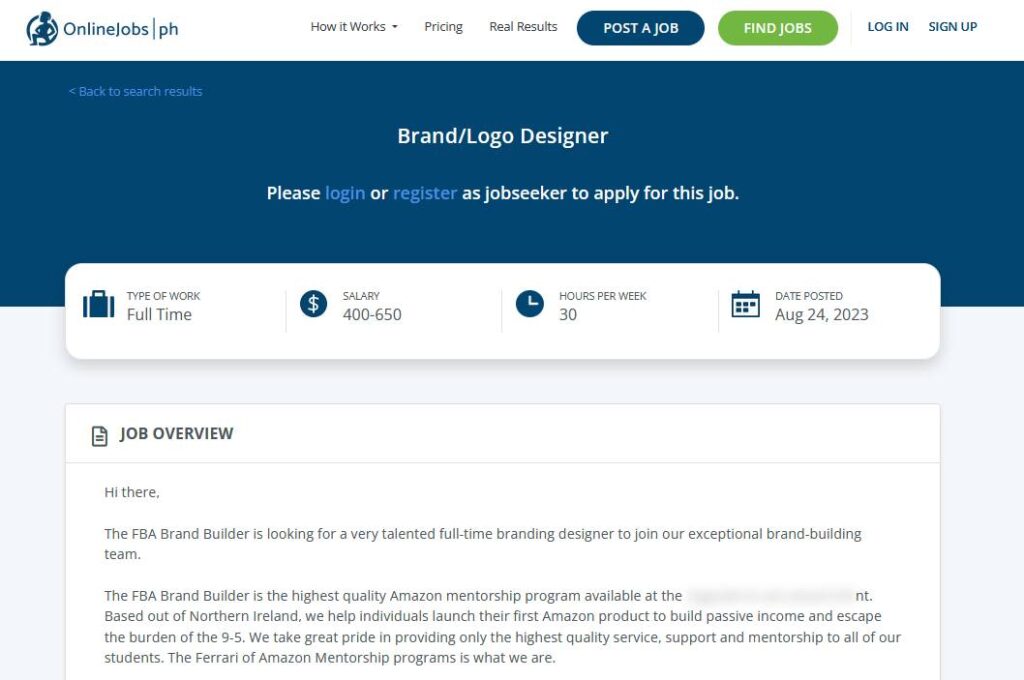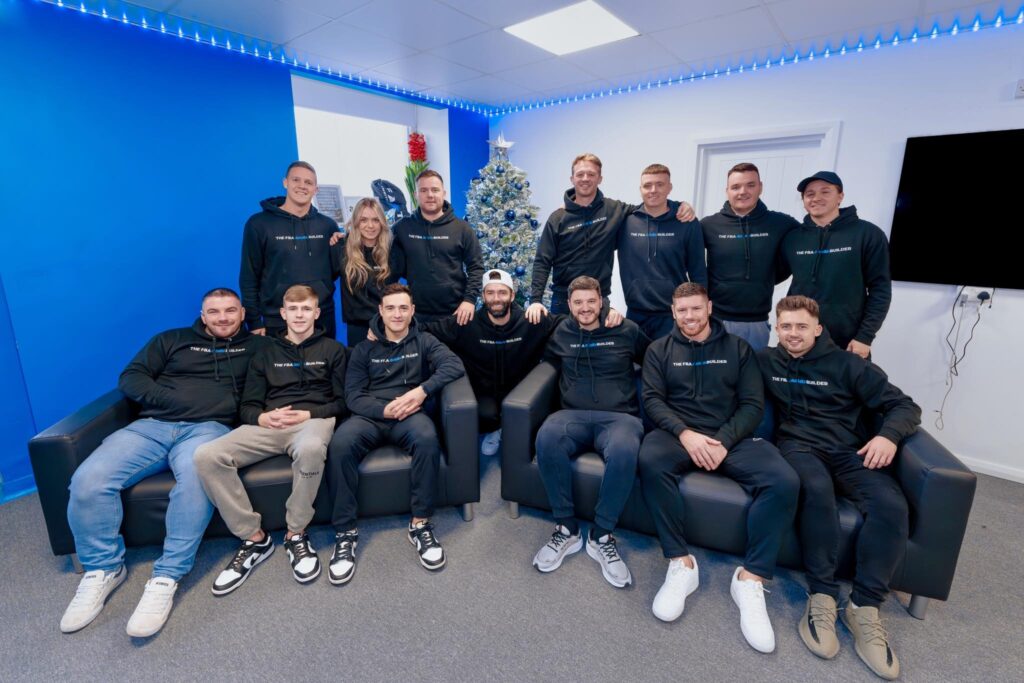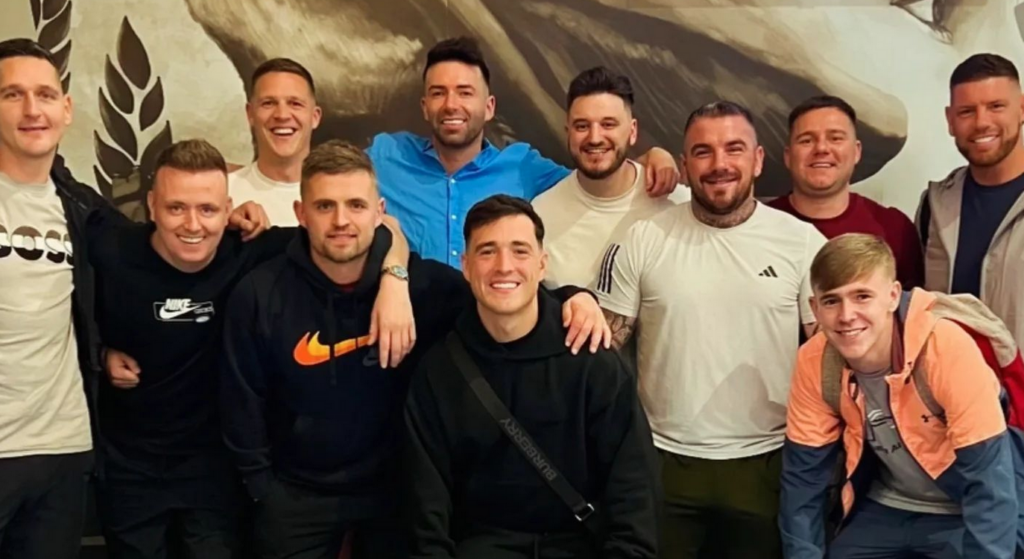Darren Campbell’s FBA Brand Builder program promotes itself as a supportive, close-knit community, built around a “family culture” that values local hiring in Northern Ireland. Yet, an investigation into the program’s hiring practices reveals a stark contrast between this public image and the reality of low-cost outsourcing. With key roles outsourced to workers in the Philippines and other regions, FBA Brand Builder’s approach raises questions about the authenticity of its team-building promises and the transparency of its business model.
The Local Team Pitch: Building Community in Northern Ireland?
Campbell’s social media posts and job advertisements frequently highlight local hiring, positioning FBA Brand Builder as a company that invests in its Northern Ireland roots. Job ads targeting Northern Irish candidates promise an opportunity to join a “family-like” team, where employees are treated with respect and encouraged to grow.
On Facebook and Instagram, Campbell has promoted roles such as Amazon PPC managers with a starting salary of £25,000 per year, promising bonuses and entry-level opportunities. The emphasis is on building a local team for training and collaboration, with requirements for in-person work at the Ballymena office for the initial training period.
However, behind this public-facing pitch lies a very different approach to hiring—a strategy that heavily relies on offshore labor, filling essential roles in design, video editing, and more with international freelancers at rates far below UK standards.
Related Article: Transparency Gaps in the FBA Brand Builder Program: Why Verified Success Metrics Matter

Outsourcing Key Roles: The Philippines Connection
While Campbell’s posts present FBA Brand Builder as a local Northern Irish company, his job postings on platforms like OnlineJobs.ph tell another story. Campbell actively recruits for crucial positions like graphic designers and video editors in the Philippines, offering pay that is significantly lower than UK rates.
For instance:
- Brand Designer: Listed at a rate between $400 and $650 per month, or around £320-£520, for full-time hours. This is roughly 80% lower than what a designer might earn in the UK.
- Video Editor: Offered at $1,500–$3,000 per month, or £1,200–£2,400, which, while somewhat competitive for entry-level roles, remains below the UK average for experienced video editors.
This substantial pay gap reveals a clear disconnect between the program’s public statements about local hiring and its reliance on outsourced roles to reduce labor costs.
Client Feedback
One former client shared, “The way the program is marketed gives the impression that you’re joining a local team and contributing to a Northern Ireland-based operation. But as soon as I looked deeper, I saw that much of the core work was outsourced.”

Why Outsourcing Raises Questions About Program Quality
Outsourcing can be a strategic way to lower costs, but in the case of a mentorship program that promotes itself as a premier service, the quality of outsourced work is a valid concern. Critical aspects of branding, design, and marketing can impact client outcomes, and these roles are fundamental to the credibility of FBA Brand Builder. However, clients might question whether an emphasis on cost-cutting impacts the quality and consistency of the services provided.
For a company that charges clients a high initial fee and additional upsells, the lack of investment in a highly skilled, locally based team may cast doubt on the overall value delivered. Prospective clients may expect a more personalized, hands-on approach, yet the use of low-cost international labor could suggest a program focused on profitability over quality.
Related Article: The Support Gap: Limited Mentorship and Community Issues in FBA Programs
The Ethical Implications of “Family Culture” Messaging
By promoting a family-like, supportive environment, FBA Brand Builder positions itself as an organization with local values and community focus. However, the extensive outsourcing of critical roles can undermine these claims. Marketing a supportive, local culture while relying on offshore labor creates a perception gap, which may mislead potential employees and clients alike.
Why This Matters
When a program’s public image differs significantly from its internal practices, it raises ethical questions about transparency. For prospective clients and employees, knowing whether they are joining a truly local team or an internationally outsourced operation affects their understanding of the program’s values and approach.
Related Article: Emotional Pressure and Financial Manipulation in High-Ticket FBA Programs

The Role of “Motivational” Messaging in Recruitment
The FBA Brand Builder program frequently employs motivational language, with phrases like “join a winning team” and “be part of a family that’s changing lives.” While motivational messaging can inspire and attract talent, it can also create unrealistic expectations if it doesn’t align with the reality of the job.
Client Feedback
One former client described feeling misled by the messaging: “The emphasis on family and local support was a big draw, but once I joined, it became clear that much of the work wasn’t even done by a local team.” Such feedback underscores the disconnect between FBA Brand Builder’s marketing language and its internal structure.
What Prospective Clients and Employees Should Consider
For those evaluating FBA Brand Builder, it’s essential to look beyond the promotional messaging and consider the real structure of the business. Knowing that key roles are filled by low-cost labor overseas may shape client and employee expectations differently than if they were joining a local, highly experienced team. This awareness is crucial for making an informed decision about joining a program that positions itself as a premium mentorship service.
Questions to Ask:
- Is the program transparent about who is providing mentorship and support?
- Are key roles within the company filled by experienced professionals, or by outsourced workers without direct oversight?
- How does the program’s reliance on low-cost labor impact the quality of support and branding services?
These considerations can help prospective clients determine whether the program’s structure aligns with the premium service that it claims to offer.
TL;DR: Transparency vs. Marketing Hype
FBA Brand Builder’s emphasis on a local, family-like culture is a major part of its appeal, especially for clients in Northern Ireland who are seeking community-focused mentorship. However, the heavy reliance on outsourcing, combined with messaging that promotes local hiring, raises questions about the program’s true values and priorities. For a mentorship program marketed as “the Ferrari of Amazon training,” transparency around team structure, hiring practices, and quality should be at the forefront.
As prospective clients and employees weigh their options, understanding the gap between FBA Brand Builder’s marketing and its internal practices is essential for making an informed choice. By seeking clarity on the program’s operational structure, they can decide whether it aligns with their expectations for a premium, transparent, and genuinely supportive environment.

